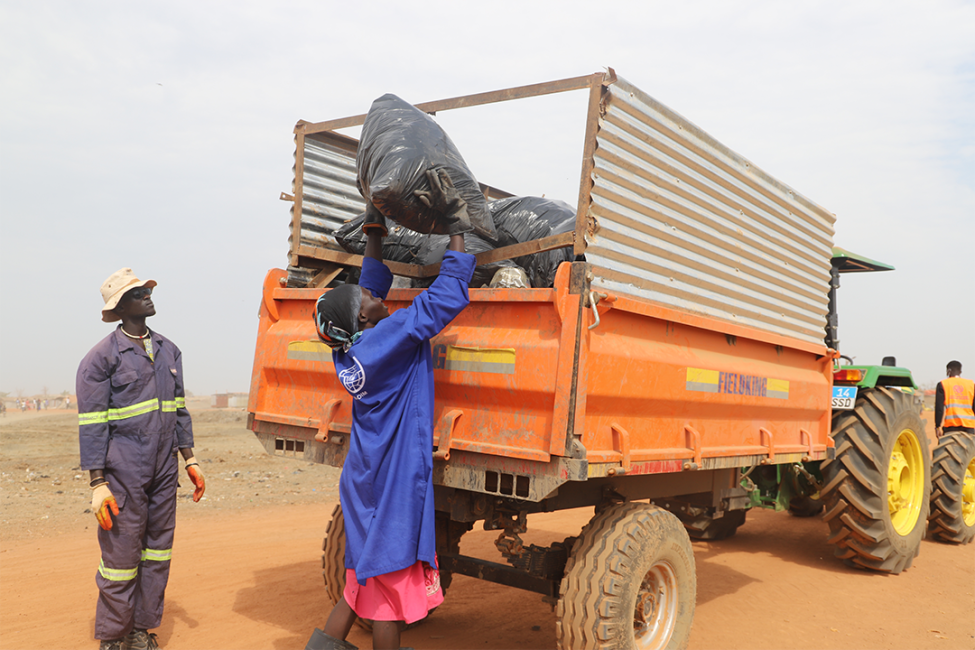-
Who We Are
WHO WE AREThe International Organization for Migration (IOM) is part of the United Nations System as the leading inter-governmental organization promoting since 1951 humane and orderly migration for the benefit of all, with 175 member states and a presence in over 100 countries. IOM has had a presence in South Sudan since 2011.
About
About
IOM Global
IOM Global
-
Our Work
Our WorkAs the leading inter-governmental organization promoting humane and orderly migration, IOM plays a key role to support the achievement of the 2030 Agenda through different areas of intervention that connect both humanitarian assistance and sustainable development. IOM South Sudan provides a comprehensive response to the humanitarian needs of migrants, internally displaced persons, returnees and host communities.
Cross-cutting (Global)
Cross-cutting (Global)
- Data and Resources
- Take Action
- 2030 Agenda
Bentiu—When solid waste collection in Bentiu Internally Displace Persons (IDP) camp came to a halt in February 2021 due to funding constraints, waste started piling up across the camp, with garbage littering everywhere.
With limited space capacity within the camp perimeter, the situation became increasingly unbearable.
“We experienced a big challenge since garbage collection stopped at the beginning of 2021,” says Mary Nyalok whose shelter in Sector 3 Block 13 is near the sanitation corridor.
Here, sometimes, open defecation was practiced, while communities continued piling garbage on the corridor.
“We could see garbage pilling and yet there would be no collection,” she recalls.
The 56-year-old mother who lives with her family came to Bentiu IDP camp with her seven children and her husband in 2014, to find safety and to restore her life since they had lost their livelihoods during the civil war that started in 2013.
The garbage posed a big challenge to the entire IDP community. Cases of diseases such as Hepatitis E were reported, including other acute watery diarrhea diseases, affecting mainly children, elderly people, and pregnant women.
In response to such a dire situation, the International Organization for Migration (IOM) resumed collecting garbage from each of the camp’s five sectors and disposing it off at the dumping site—away from the camp.
Mary Nyalok is one of the garbage collectors. She was first selected in 2015, as one of IOM’s garbage collectors at the sector level.
Now, she is helping to drive the scaling-up of solid waste management activities across the camp.
“Life was not easy when we came here, considering the means of livelihood were interrupted by the conflict,” says Nyalok. “But I was lucky to be selected as a garbage collector in Sector 3 Block 13 by IOM and I now can get something (money) for my family.”
Nyalok is among those garbage collectors who are committed to keeping the IDP camp clean. She believes the spirit of creating and maintaining a clean, safe, and healthy environment is a duty of everyone across the camp.
“I am aware that when people keep the environment clean, it prevents the outbreak of diseases such as typhoid and also Hepatitis E. That’s why we are also creating awareness in the community so that everybody participates in maintaining their environment clean,” she adds.
With the coordination of other partners, IOM is responsible for the disposal of solid waste across the IDP camp.
In every sector, there are garbage collectors under Water, Sanitation and Hygiene (WASH) partners responsible for the collection of garbage within each block of settlement. The garbage is then taken to the block’s central collection points where IOM collects for disposal at the garbage landfill.
To further support this initiative, IOM combined these activities with a regular environmental cleaning campaign and Hygiene Promotion messaging through its network of 55 Community Hygiene Promoters, which also disseminated information about the safe disposal of garbage.
“Our work with the garbage cleaners and hygiene promoters is not only to safeguard the environment but also to make sure they earn some money to support their families which plays a pivotal role in improving the community living standards and reducing poverty,” says Sherman Mutengu, IOM WASH Officer in Bentiu.
“They are not going outside the camp to look for firewood for sale because they can actually rely on this work for income.”
To date, IOM continues to manage solid waste across the entire camp, having transported an average of 300 metric tons per week to the landfill for disposal, since it took over these services in Dec 2021, ensuring a clean environment for over 120, 000 living in the IDP camp.
This activity has gone a long way in preventing the spread of diseases such as cholera and Hepatitis in the camp.
“Water supply, sanitation, and hygiene is the backbone of prevention of diseases, especially in congested communities like this one. We are talking about diseases like cholera, diarrhea, and hepatitis E.
“Ensuring safe water quality supply, solid and liquid waste management and also the knowledge on how communities should manage at household level is very important.”
There is a need to continue with support because most of the areas are flooded and we might expect more people to come into the IDP camp so that in case of influx, we shall have resources to respond and provide these services.
IOM’s WASH services are funded by USAID's Bureau for Humanitarian Assistance (USAID/BHA), the European Union’s Civil Protection and Humanitarian Aid Operations (ECHO) and the Foreign, Commonwealth and Development Office (FCDO).
This story was written by Jale Richard, Media and Communications Assistant, South Sudan

